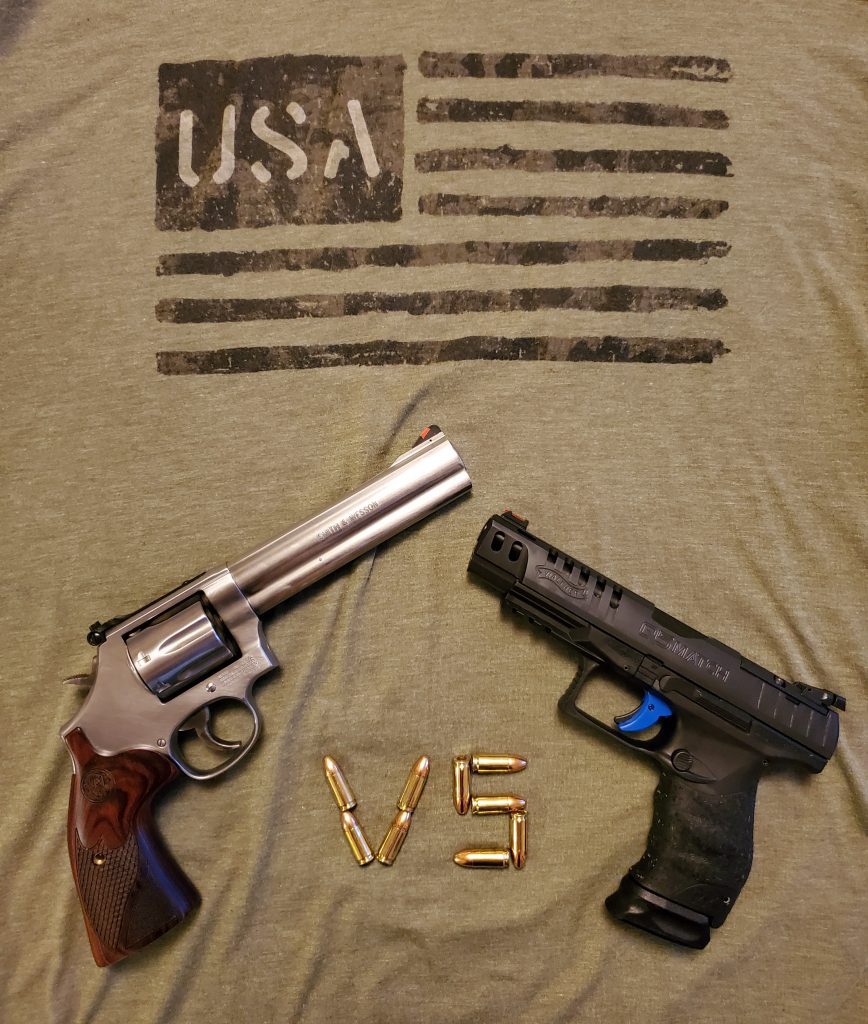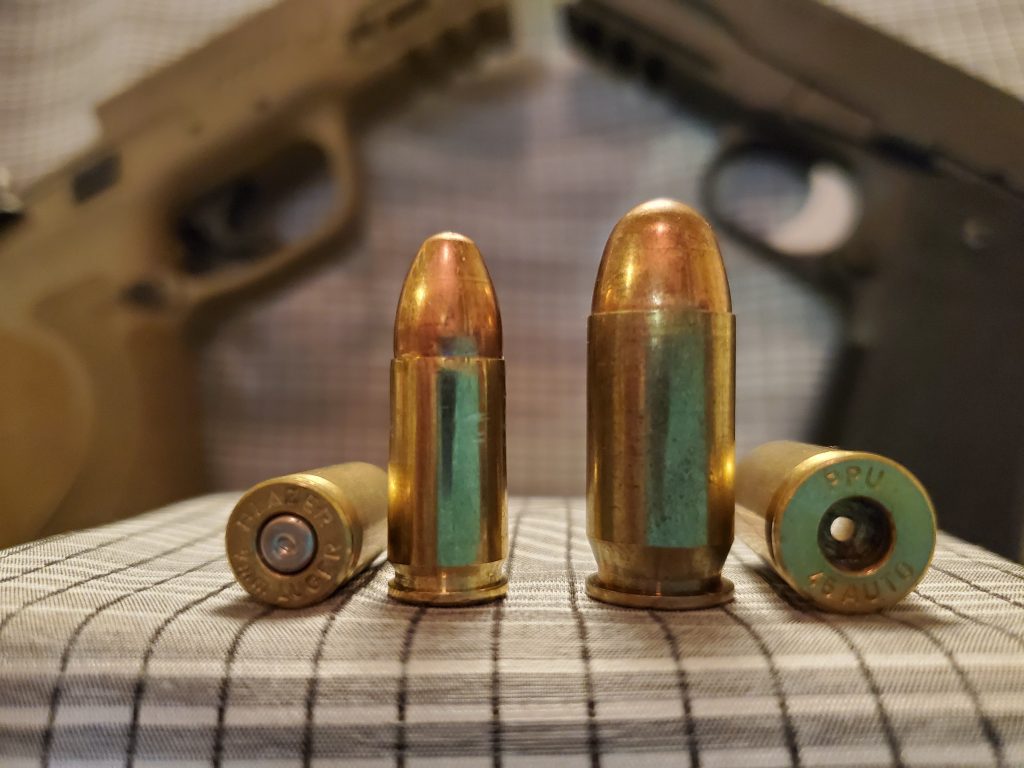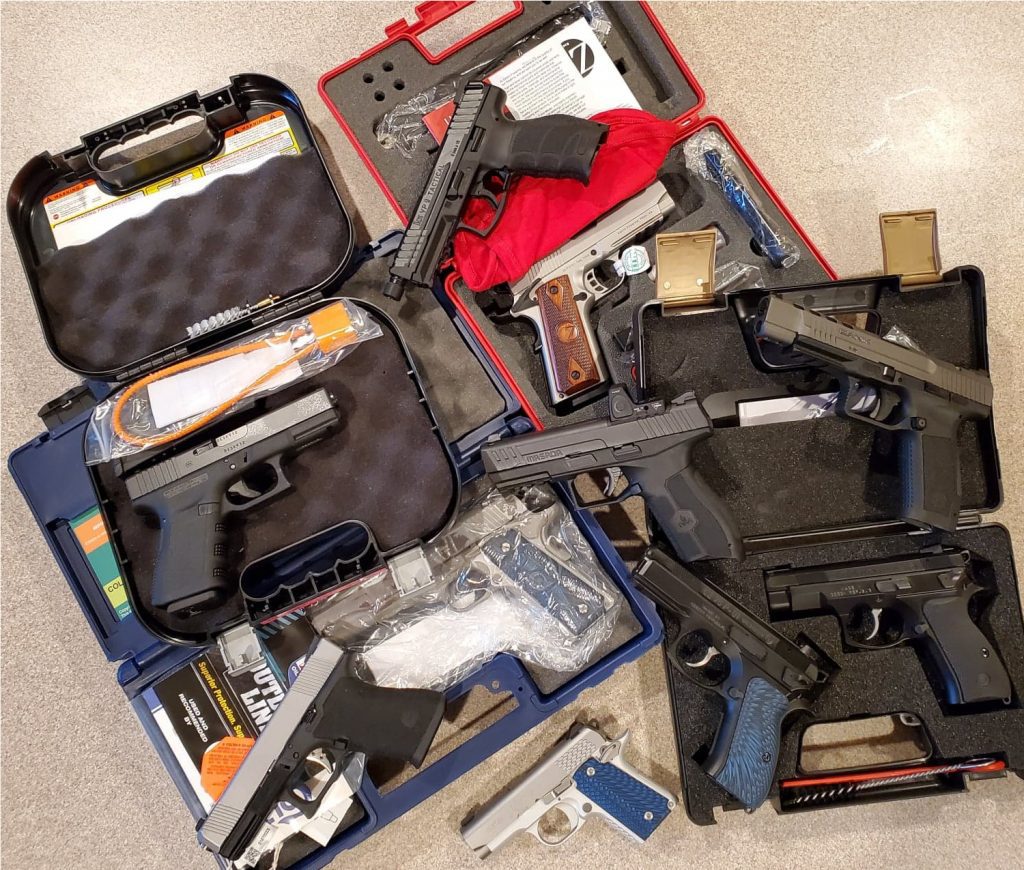We get asked this question at least once a week, if not daily. We figured it is time to write an article about it.
If you have issues understanding the terminology in this article, we highly recommend you take a basics of handgun course before you purchase a handgun.
What handgun to buy is like asking what vehicle to buy. The first thing we ask is what is the use case, meaning what do you want to use it for. Carry, home defense, target shooting, etc… Much like what are you going to use the vehicle for, people, moving, work etc…
Just like with vehicles there is not one that does everything. There are some that are multi-functional but none that are one fits all. Once we determine the use, we can start narrowing down the type of handguns to consider.
Use Cases
If the use is for target shooting and not mission critical (needs to save your life) there are a lot of options. Target guns typically are not good for defense. The triggers, reliability (not that they are unreliable), weight, and shape are designed for steady hand target shooting and not defensive shooting.
If the use is for home defense and not conceal carrying, we recommend the biggest handgun the person can accurately handle. Why the biggest? First, it will give you the most ammo capacity. Second, the extra weight (in reason) and longer barrel allows the person to be more accurate.
If the use is for conceal carry (which typically means home defense, too) we recommend a mid-size / compact handgun. Examples of these are the Glock 19 and HK VP9. There are many other brands and models that fall into this category.
Size


Now that we have a little foundation on the three main use cases, let’s look at some other considerations. Size matters as the saying goes. For handguns, size matters because the more mass the handgun has the more the handgun will absorb the movement during firing. The less mass, the more your fingers, hand(s), arm(s), and body has to absorb. That is why people do not like small guns once they shoot them. They may feel great in your hand at the store but shoot the first round and your hands and arms hurt. This is a very common mistake first time buyers and gun store sales “experts” make.
Revolvers
The next thing we need to discuss is revolver versus semi-automatic. Revolvers have been around for almost 200 years. You see them in all of the old cowboy movies. Revolvers have very limited ammo capacity and reloading a revolver can be slow. There are techniques and accessories to make reloading faster and easier but it is typically slower than a semi-automatic.
Some people think revolvers are better for self defense because they are simplistic mechanically. This is a very old mindset and not accurate. No major law enforcement agency in the US uses revolvers. There are many reasons for that and the switch to semi-automatics started in the late 80’s. There are some smaller agencies that still let their senior officers carry revolvers but not many.
Semi-automatics
Semi-automatics provide for more ammo capacity (if you live in a free state) and reloading is quicker and easier. There are so many manufacturers, sizes, colors, materials, quality, reliability, ergonomics, and prices for semi-automatics it is amazing. So which one do you choose now that you have the use and decided on a semi-automatic?
Well, lets go back to our vehicle example. So we know we want a car and not a van or truck. Color, ergonomics, and materials are probably not the most important (and they should not be the most important). The most important should be reliability and quality if this is a defensive gun. Just like cars, there are many opinions on who has the best reliability and quality. There are websites and reviews for both cars and vehicles. We would caution you to not over analyze from the internet.
You should research which brand is the most used for law enforcement and defensive uses. We can save you time and tell you that is Glock. We don’t want to be one of those Glock fan boys but there is a reason they are in the majority of law enforcement agencies. Are Glock’s perfect? Of course not. Nothing made by humans is perfect. The biggest complaint we hear from our students is the feel of Glocks. Glocks are not the most ergonomic, but the Gen 5’s seem to have the best ergonomics of the generations.
Ergonomics
Ergonomics is always a big topic. The way we approach this is to treat ergonomics as 2nd or 3rd to reliability and quality. If you can’t shoot a Glock well because of the shape and feel then I would look at something else. But we would take a less comfortable but more reliable handgun every time. Defensive shooting is not target shooting and you don’t need and won’t be able to shoot dimes while moving under stress. Losing a percentile of accuracy from being less ergonomically comfortable is worth the trade off.
When you train with a lot of people including operators, instructors, and students you see what everyone is using. We can say without question the handguns we see most and that very seldom break are Glock’s. We have seen many 1911’s ($3000 high-end guns), Ruger, Taurus, S&W, and Springfield break way more often than Glock’s (we could list all the other manufacturers but these as an example and mean nothing by the order and severity). Our instructors own all these other brands but for different uses. Now when we go to instructor trainings it is almost always 100% Glock. There will always be those never Glock people but it is few and far between in what we do. Competition is completely different.
Reliability
Let’s look at the overall reliability of a semi-automatic versus a revolver again. When we look at the schematics of some common revolvers there are 70-80 different parts. When we look at the schematics of a Glock which hasn’t changed much in 30 years, we see 36-40 parts depending on model and generation. That comparison alone shows less parts to break in a Glock over most revolvers.
Let’s end on the years of use and testing. Because Glock’s have been in service for 30+ years there is plenty of reliability information to review. There is no other single manufacturer or design that has this type of track record (maybe 1911’s but not sure if one manufacturer has made more than Glock). Seeing how we just brought up 1911’s and there are lots of 1911 fan boys out there, our position is simple; 1911’s are terrible for defensive weapons. That statement is coming from people that have carried 1911’s for self defense and still own plenty of 1911’s. Today it would be close to last on the list of our guns we would grab for defense. It would take another article why 1911’s are terrible self defense weapons. And for all the hate email we will probably get from the old timers that know no difference… Send it 🙂
All joking aside we believe in this simple rule; any gun is better than no gun.
For all other uses like collecting, buy whatever you want and take care of them.
Caliber
Just buy a 9mm. We could write a book on the caliber debate, much like which manufacturer and model. Years ago caliber mattered more, but with innovations in ammo manufacturing the 9mm is very effective. You are seeing less and less 40 S&W caliber’s for sale and the ones you see are discounted. We haven’t bought a 40 S&W in years and don’t plan to anytime soon.
What about 45 auto/acp versus a 9mm? This is always a good debate. Many 1911’s come in 45 and you know our opinion on 1911’s. Yes, 45’s are bigger in diameter than 9mm but they are also slower. Many old timers believe the knock down power is better with a 45. That is probably true if we look at raw ballistic measurements. Once again, those are typically years old and the newer 9mm is much better.
The main reason for 9mm over 45 is you get more ammo in your gun with 9mm versus 45. At the end of the day, shot placement is the most important. If you can’t hit what you are shooting at, it does not matter the caliber. Anything less than a 9mm is really not the best for defense but if you give a head shot with a 380 or 22lr the person is probably going to have a bad day.




Pingback:The Soap (Blood) Test - Enhanced Tactical - Training
Here is a good article about police agencies forcing their officers to carry semi-automatics. https://www.wfaa.com/article/news/local/dallas-police-switch-revolver-semi-automatic/287-2a12d753-1ece-4b94-8a1c-f7a31aa943c1?fbclid=IwAR323CMlbqv6arlT02Dde4AxEenhqdc6fP28uKGHH14uIm9iavXTu-sMw94